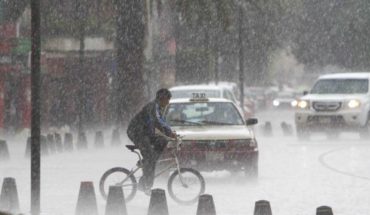Emotional decay, melancholy, social isolation and even stress in the face of crowds, parties, noise and the self-demand to be happy, are some of the emotional states that children and adults could feel during the end of the year celebrations.
These emotions emerge as a result of the imbalance between high previous expectations and the frustration of a less pleasant reality, explains the clinical psychologist and specialist in psychotherapy at the University of Talca, Natalia Uribe.
For the academic, during these days in some people there is a decay product of this massive emotional climate, “because culturally we tend to associate celebrations with the closeness of our loved ones. So, many times it is suffered because we cannot be with them, either because they have died or because they are far away and there is geographical distance or because there are conflicts in communication.”
The positive part of these dates, he says, is that these are temporary situations that pass quickly, “which helps people to move through and not remain in this unpleasant emotional state.”
However, emotional decay should not be confused with depression, since the former is associated with certain calendar dates, while the latter is described more as a permanent condition of the subject, “more complex and multifactorial, which is not related to temporal events”.
“A person doesn’t have to feel forced to be happy. Not because we are in a context of New Year’s Eve parties, we must force ourselves to feel something we do not feel,” warns Uribe.
If the person feels stressed or suffers from an emotional decay, they should seek help. “Being left alone, especially in situations of melancholy or decay, generates isolation and aggravation of these emotions. Just communicating with each other is already very healthy, whether it’s physical or virtual communication,” he suggests.
According to the psychoanalyst, another emotional state that can arise at this time is stress, which is directly linked to “the demands that we impose on ourselves, for example, for the purchase of Christmas gifts, the celebrations that must be perfect or the physical state to wear the new one,” she listed.
The main advice is to be realistic, and remember that these holidays don’t have to be perfect. “We should not impose too high expectations on ourselves, nor feel urgency to be happy or that everything goes perfectly. These festivities should not be idealized or place high expectations on them, as a way to avoid subsequent frustration,” he argued.
“If I know, for example, that there will be people who don’t do me good at family reunion, I don’t have to feel compelled to go. Not wanting to go is also a right as a person. Learn to say no,” he said.
Beware of stress
Stress is a normal psychological and physical reaction to demands. Everyone can feel stressed or anxious at some point in their life, and this can be a positive factor when it motivates them to perform well. However, when high levels of stress are maintained for a long time, it can affect your interpersonal relationships, your health and your quality of life2.
According to the study “Thermometer of Mental Health in Chile” conducted by the ACHS and the UC, during 2021 45.9% of Chileans presented changes in their mood, associated with stress. Mayo Clinic explains that there are several factors that can trigger stress, such as work pressure, relationship problems, financial worries, getting married, changing houses, among others.
Any change in life can be a trigger for stress and the effects of it can occur in a variety of ways: physical (such as headache, muscle tension, fatigue, sleep problems), emotional (such as anxiety, restlessness, irritability, depression and lack of motivation) and behavioral (excessive consumption of food, social isolation, sedentary lifestyle, outbursts of anger)2.
“Identifying stress triggers can help you think of strategies to combat it and avoid its effects. It is essential to incorporate healthy habits in the day to day that help you relieve stress and anxiety, since in this way you will be taking care of your health in the long term, “says Dr. Lorena Galeotti.
The last quarter of the year is a time when people are more exhausted and stressed, something that is accentuated in a context of pandemic, adaptation to new work formatsand social changes. This is complemented by a study by Senda, which revealed that the consumption of tranquilizers increased by 40%.
To these data, a survey prepared by LinkedIn to more than 5,000 workers is added, estimating that 74% of women and 61% of men feel stressed. In fact, of the total electronic medical licenses issued in the first 8 months of the year, “Mental and Behavioral Disorders” reaches almost 30%.
The psychiatrist and General Manager of Grupo Cetep, Claudia Barrera explains that “stress is the tension that, remaining prolonged over time, or that, being very intense, or both at the same time, exceeds the physiological and psychic energy availabilities of the person, and leads to exhaustion”, who also points out that “it should be noted that, all people have different ways of coping with the stress of the end of the year, so it is important to cope with this problem, to reduce the symptoms in time.”
Symptoms of stress in the body
Headache, muscles and feeling that your eyes are constantly shivering, are some of the signs that warn us that we could be living a picture of stress. Symptoms that with the end of the year, increase more and more.
Tremor in the eye is not associated with a specific cause, but it can be caused by stress or anxiety, at certain times in life. “It is advisable to sleep more. Reduce caffeine intake. Moisturize the eyes
with eye drops or eye drops,” says the psychiatrist.
Headache is the most common symptom of stress and is caused by the muscle tension we exert on the head, jaw and neck, among others. “Control breathing, stretch your neck and shoulders; stretches arms and head; stretch your back and wrists and tilt your head and chin. Give yourself a break and practice these exercises for 5 minutes will relieve tension
and discomfort,” explains Dr. Barrera.
When we get stressed, what happens is that we automatically think about the muscles of the jaw, the ones that surround it.
the eyes and mouth, as well as the muscles of the neck and back. This is a reflex reaction to protect us. And, in fact, it’s not bad, except when stress becomes permanent in our life. “It is advisable to apply heat compresses on the affected area to facilitate muscle relaxation. Mindfulness is also an excellent method to combat muscle tension due to stress because it increases emotional awareness, facilitating the management of emotional states, “he adds.
The psychologist of Nueva Clínica Cordillera, Patricia Canales, explains that the pandemic generated an exceptional situation that “has caused deep uncertainty regarding the future in the midst of a health crisis, in turn, as well as fundamental aspects such as relationships and the economic situation.”
This added to the social isolation and the increase in the workload, due to the reconciliation of life with telework or virtual classes, have altered lifestyles and the protection of moments of recreation.
Canales also highlights that permanent stress symptoms could cause “various physical symptoms that can disable and complicate people’s lives, and that, if not treated in a timely manner, can lead to more complex disorders, such as sleep disorders, eating disorders, depressive symptoms and episodes of panic attacks” which according to the specialist are the ones that have occurred most during the pandemic and the current readaptation.
Regarding the optimal perception of the stress condition, the professional suggests paying attention to changes in habitual behavior and “basic cognitive functions of concentration, which decrease and impact on memory”, given that through them it is possible to perceive that it is “difficult to interact in daily life in different contexts such as work, social or academic”.
Stress could alter our immune system and processes as important as neuroplasticity, which corresponds to “the brain’s ability to change and adapt to new experiences”, something that according to the psychologist is fundamental in the face of the continuity of a pandemic and in the midst of a polarized political context that will have an impact on the future of Chileans and that “due to the scope of the current presidential elections and the eventual changes that these they could generate in the lives of citizens, it is natural that the feeling of uncertainty and anxiety increases, in the face of two possibilities so different from each other”.
Therefore, the specialist emphasizes that it is precisely thanks to neuroplasticity that “we are able to adapt, learn from new situations and cope with cThese may seem adverse”, so in the case of adults stress has a “direct and debilitating effect on the immune system”, increasing irritability, demoralization, insecurity and distrust.
On the other hand, in the case of children, this can affect “thoughts, emotions and behaviors associated with a negative impact on safety, trust, establishment of interpersonal relationships, self-image and self-concept”, since children have not only been limited to attending their schools, but have been constrained with respect to outdoor activities, in a context in which “playing not only has a function of entertaining, but also serves to socialize, because through play, children learn the rules and know how to interact to reach some goal”.
New Year’s Eve parties can trigger stress, anxiety and emotional decay
December 30, 2021 |





